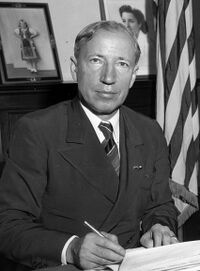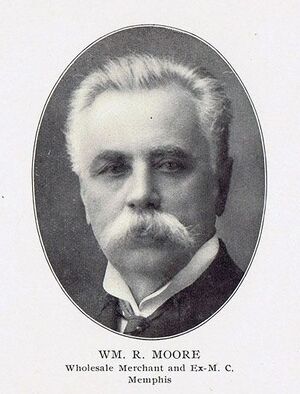Tennessee
 From Conservapedia
From Conservapedia | Capital | Nashville |
|---|---|
| Nickname | The Volunteer State |
| Official Language | English |
| Governor | Bill Lee, R |
| Senator | Bill Hagerty, R (202) 224-4944 Contact |
| Senator | Marsha Blackburn, R (202) 224-3344 Contact |
| Population | 6,850,000 (2020) |
| Ratification of Constitution/or statehood | June 1, 1796 (16th) |

|
Motto: "Agriculture and Commerce" |
Tennessee is one of the most conservative states in the United States, with evangelical Christians comprising a significant proportion of the electorate. Tennesseans have traditionally volunteered for military duty or to support freedom at a very high rate, giving the state the nickname "the Volunteer State" (the name came about mainly due to Tennesseans fighting for Texas independence at the Alamo). The capital of the state is Nashville.
Tennessee consistently votes Republican in presidential elections, though Memphis is a solid Democrat stronghold and Nashville is moderately so.
Some wanted Tennessee to be named after Benjamin Franklin, but supposedly the Indian name of "Tennessee" was suggested by Andrew Jackson, who became its first member of the U.S. House of Representatives after Tennessee became the 16th State.
As a frontier territory in colonial America, Tennessee developed many marksmen who were skilled with rifles. When fellow Tennessean General Andrew Jackson called for volunteers to help him fight the British in New Orleans at the end of the War of 1812, Tennessee marksmen volunteered in droves and provided the young nation of America with its most decisive victory at the Battle of New Orleans. Tennessee also provided many volunteers (notably Davy Crockett to assist Texas with its independence attempt, thus giving it the nickname The Volunteer State and the team name for University of Tennessee sports teams).
Notwithstanding Tennessee's overall decision to secede during the Civil War, the eastern portion of the state (which is mountainous and not suited to plantation farming) remained loyal to the Union. In fact, except for two elections in the mid-1870s (and notwithstanding the political shifts between the Republican and Democrat parties as to viewpoints), it has voted for Republican congressmen in every election since prior to the Civil War.
In 1920, Tennessee was the state that provided the necessary number of states to ratify the Nineteenth Amendment to the U.S. Constitution, a victory for the suffragists.
On March 13 1925, the teaching of evolution was banned in the state.[1]
In 2000, Tennessee voted against its own former Senator and Vice President Democrat Al Gore, an example of the independent-minded Christian voters casting their ballots based on principle. This was the first time a presidential candidate has lost his own home state; had he won Tennessee he would have won the election, and the controversy surrounding Florida balloting would not have mattered.
In February 2007, State Senator Raymond Finney (R-District 8) introduced a resolution [2] essentially asking why is "creationism not taught as an alternative concept, explanation, or theory, along with the theory of evolution in Tennessee public schools?"[3] Tennessee has had a prominent role in this debate, dating back to the Scopes trial of 1925.
Tennessee has long been one of the few states not to have an income tax, although its sales tax is one of the highest in the nation (and is also assessed on food).
In 2017, the state enacted a law providing major protections to free speech on college campuses.[4]
The state Constitution of Tennessee, like all of the other 50 states, acknowledges God or our Creator or the Sovereign Ruler of the Universe. It says:
- That all men have a natural and indefeasible right to worship Almighty God according to the dictates of their own conscience; that no man can of right be compelled to attend, erect, or support any place of worship, or to maintain any minister against his consent; that no human authority can, in any case whatever, control or interfere with the rights of conscience; and that no preference shall ever be given, by law, to any religious establishment or mode of worship.
Contents
Famous political figures[edit]
Eastern Tennessee[edit]
- Roderick R. Butler, early GOP representative from the 1st district
- Leonidas Houk, early GOP representative from the 2nd district
- John C. Houk, son of Leonidas Houk who succeeded him
- B. Carroll Reece, longtime conservative Republican from the 1st district
- Oscar B. Lovette, defeated Reece in 1930 and lost re-election in 1932
- Louise Goff Reece, widow and successor of Carroll Reece
- J. Will Taylor, Republican representative from the state's 2nd district in the 1920s and 30s
- John Jennings, Jr., succeeded Taylor in the House
- Howard Baker, Sr., defeated Jennings for renomination
- Howard Baker, Jr., U.S. senator from the state
- Irene Baker, stepmother of Howard Baker, Jr. and brief U.S. representative
Western Tennessee[edit]
- William R. Moore, Republican entrepreneur and congressman who has the William R. Moore College of Technology named in his honor
Elected officials[edit]
Federal[edit]
- Sen. Marsha Blackburn (R)
- Sen. Bill Hagerty (R)
- Rep. Diana Harshbarger [R, TN–01]
- Rep. Tim Burchett [R, TN–02]
- Rep. Chuck Fleischmann [R, TN–03]
- Rep. Scott DesJarlais [R, TN–04]
- Rep. Jim Cooper [D, TN–05]
- Rep. John Rose [R, TN–06]
- Rep. Mark E. Green [R, TN–07]
- Rep. David Kustoff [R, TN–08]
- Rep. Steve Cohen [D, TN–09]
Statewide[edit]
- Governor Bill Haslam (R)
- Lt. Governor Randy McNally (R)
- Attorney General Herbert Slatery (R)
- Secretary of State Tre Hargett (R)
- State Treasurer David Lillard (R)
See also[edit]
References[edit]
- ↑ Michael Gryboski (March 8, 2020). This week in Christian history: Tennessee bans evolution, Iconoclasts defeated, UK Christian group formed. The Christian Post. Retrieved on March 9, 2020.
- ↑ Text of the Resolution PDF
- ↑ Bristol Herald Courier Editorial
- ↑ Mason, Ian (May 11, 2017). Tennessee Enacts Nation’s ‘Most Comprehensive’ Campus Free Speech Law. Breitbart News. Retrieved May 11, 2017.
Categories: [States of the United States] [Tennessee] [Red States]
↧ Download as ZWI file | Last modified: 02/26/2023 16:19:38 | 173 views
☰ Source: https://www.conservapedia.com/Tennessee | License: CC BY-SA 3.0
 ZWI signed:
ZWI signed:


 KSF
KSF